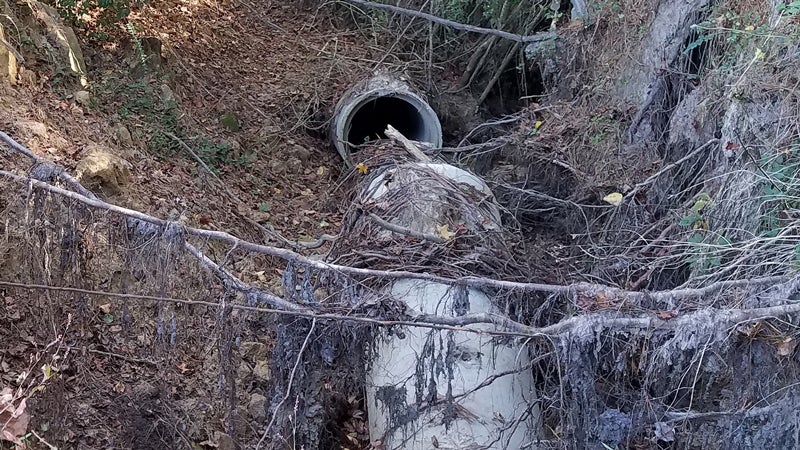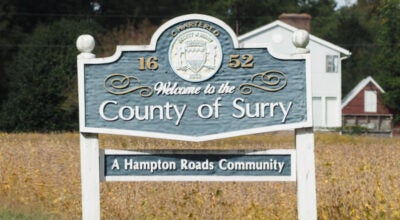Plaintiff in Isle of Wight stormwater lawsuit dies
Published 5:03 pm Monday, December 19, 2022

- Otis Brock, who died Dec. 11, 2022, had been one of three plaintiffs in a federal lawsuit alleging Isle of Wight County illegally took and damaged his and his neighbors' land by refusing to repair a collapsed stormwater pipe that spans their properties. (Nov. 10, 2020, file photo by Stephen Faleski | The Smithfield Times)
One of the plaintiffs in a lawsuit against Isle of Wight County over a collapsed stormwater pipe has died.
Otis Brock, 88, died Dec. 11, according to his obituary. Brock and his neighbors Brian and Sue Fernaays had filed a federal lawsuit against Isle of Wight in 2021, alleging the county had illegally taken and damaged their land by not repairing the pipe.
The collapsed pipe is located in a 20-foot easement spanning 10 feet into both yards and provides stormwater retention and drainage for nearby public roads. The neighbors blame the pipe for the runoff that’s been washing away their land since 2018, and for the resulting sinkhole that’s grown into a 12-foot-deep, 20-foot-wide chasm spanning the property line.
Brock’s family will inherit his case, according to the neighbors’ attorney, Joe V. Sherman.
The county argues it doesn’t own the easement and refers to easements that lack clearly defined owners as “orphaned outfalls.” According to Isle of Wight County Circuit Court records, the pipe was installed in the early 1990s but a specific owner was never designated.
County officials authored a paper in October 2019 titled “Orphaned Outfalls in Rural Virginia Localities,” intending the document for the Virginia Association of Counties. It argues that while modern regulations now require such easements to be dedicated to a development’s homeowners association, subdivisions built out in the 1990s and prior frequently lack a stated designee responsible for the stormwater system’s upkeep. The development’s builder or homeowners association “was the implicit beneficiary,” the paper argues, but in cases where such associations are now defunct or never existed, “an unanticipated and costly asset remains.”
In 2016, Isle of Wight successfully negotiated with the state Department of Environmental Quality to be released from its municipal separate storm sewer system (MS4) permit obligations, arguing it did not own or operate a municipal stormwater system. This allowed the county to cut the stormwater fee it adds to the real estate tax bills of residents and businesses by about 25% — dropping it from $72 to roughly $53 per year for most county residents. If the county were to acknowledge municipal ownership of a stormwater system or agree to maintain or repair privately owned stormwater outfalls, it would run the risk of once again being subject to an MS4 permit – and potentially would need to increase its stormwater fee to cover its repair and maintenance obligations, the “Orphaned Outfalls” paper argues.
No trial date has been set. According to the most recent court filing, dated Sept. 27, dueling motions by the neighbors and the county, each seeking summary judgment in their favor, are still pending.
The matter was originally to go to trial in April, but U.S. District Court Judge Arenda L. Wright Allen struck the date pending her decision on the summary judgment motions.
A request for summary judgment asks the court to rule on the merits of a case without the matter ever going to a jury. The dueling summary judgment motions have each been pending for more than a year.
Isle of Wight made its summary judgment request on Nov. 24, 2021, asking the court to dismiss the case and order the neighbors to pay the county’s legal costs to date on grounds that there is “no dispute as to material facts.” Two days later, on Nov. 26, 2021, the plaintiffs filed their own summary judgment request, asking the court to declare the county liable for having taken and damaged their property without just compensation. The neighbors also contend there is “no genuine dispute as to any material fact,” and ask that the court put only a single question to a jury: How much money are they owed?
In March, the county convinced U.S. Magistrate Judge Lawrence Leonard to exclude four witnesses who’d planned to testify on behalf of the neighbors.
Sherman had planned to call John T. “Jack” Claud III and John “Steve” Ferguson, both of the Portsmouth engineering firm Hoggard-Eure Associates P.C., as experts. Also on his witness list were title examiner Patricia Raper, appraiser Dennis Gruelle and Realtor Nanette Criddle. Leonard granted the county’s request, characterizing the witnesses’ proposed testimony as “unreliable,” and ordered that Raper be allowed to testify only in a non-expert capacity.





